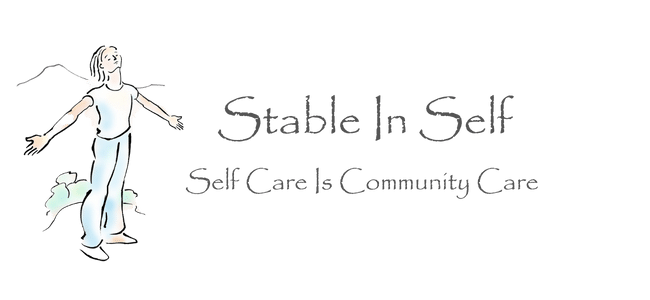
Stable In Self Guiding Principles
Something that I feel sure and clear about even though there is very little that I actually know, is that practice creates possibility. By having a practice that I am committed to personally and communally, I can do, move, and be based on the roots of that practice. The practice is my/our guiding principles, the guiding principles are my/our practice. When we are confused, heartbroken, excited, enraged, and full of wonder, our guiding principles, whatever they are, help show us the way forward.
Within all that I do, be, and share with the world around me, I am an advocate for community care. I believe in the power of community and I know that being in community is necessary for my own spiritual growth and development as a human person. I believe that community care begins with self care. When I am stable in self, I can be stable in community. Likewise, a stable community offers me space to become stable in self. This stability I speak of is a living, breathing practice, not a static end goal. Shall we practice together?
We need each other. We need the folks who look like us and be like us, and we need the folks who do not look like us and do not seem to be like us. We are each others’ teachers, with some more challenging or frightening than others. This world we live in is weird, and beautiful, and awful. It is full of love and compassion and it is full of hate and bigotry. I am full of love and compassion and also sometimes I act hatefully, and I believe the same is true of you. So unless I unpack my own crap and really look at it, with all of my senses, I will not be able to change, to grow, to transform. If we want to transform the unjust culture in which we live, we must transform our own selves. Self care beings with me, but it is not about me.
The Suggestions For Group Harmony that follow were created to be read, studied, and used for any gatherings that I host. If you attend a workshop, retreat, or other group gathering that I have organized, we will read them. If it is a multi-day activity, we will read them each day. We will take the time and create the space for this practice together because it is important. There is nothing that matters more than how we be together, because how we be together is the foundation for anything that we do.
Many folks who have read these with me, say that they began to use some of them in their own family and community relationships. Please use them in whatever way feels good to you. Take what resonates, and leave the rest. You are welcome to copy them, to change them, to adopt one of them and study it for a month. If they are supportive, use them however you like. As a community organizer moving within various activist-type groups as well as “spiritual” groups, I’ve been in many circles that felt nourishing and safe. I’ve also sat in many that offered a lot of anxiety, criticism of self and others, intimidating leadership, subtle and less subtle forms of racism, white supremacy and saviourism, homo and trans-phobia, and a general lack of compassion and willingness to listen.
The main difference, in my experience, in the circles that feel safe and the ones that don’t, is a lack of community practice and compassionate accountability. The individual humans in any of the community groups I’ve been a part of, including the community that is my own biological family, are simply trying to figure out how to be a human in this weird confusing world, just like me and just like you. If we are willing to know that together, to be uncomfortable together, to inquire, and mess-up, and be compassionately accountable together, maybe, just maybe, there is a path forward for each and all of us.

Suggestions For Group Harmony
These suggested practices are meant to bring unity and cultivate space for compassion, trust, accountability, and transformative learning. They support a safer space for all of us to be, learn, and grow, individually and collectively. By honoring the agreements below, we honor ourselves, each other, and the collective.
These are agreements to practice, not mandates of how or what we should do or be. They ask us to make a conscious effort, and when we falter, because we will, to return to the practice without shame or judgement of self or others. We agree to practice the principles together as a group, and by doing so are able to utilize the principles in all areas of life. We become as we practice, and practice creates possibility.
We agree to practice being settled in our space several minutes prior to the start of group gatherings. This includes being settled, with screen on a few minutes prior to the start of live, virtual gatherings.
We agree to practice awareness of how much energetic space we take up within the group. This means being conscious of how often our individual voice is heard in relation to the other participants, as well as the way in which we share. Our practice of sharing is meant to nourish the discussion and support the group as whole.
We agree to practice welcoming silence, and invite pause within our own mind and group discussion. Silence and breath are necessary members of our group, and offer space to tune into ourselves and the energy within the group. After someone else has spoken, we take a few breaths to digest and honor their words before raising our hand or chiming in.
We agree to a come-as-we-are practice, and allow space for vulnerability, doubt, fear, grief, anger, joy, gratitude, celebration, and everything in between. This practice of vulnerability is a radical act of healing for the self, community, and all beings.
We agree to practice compassion and non-judgement as a means of honoring and respecting the views and opinions of the entire community. This does not mean we all agree on everything, but we welcome all views and opinions. Within the unjust culture in which we live, our different life experiences, varying points of privilege, and the reality of oppression affect how we be and move in the world. We practice inclusivity by allowing our own minds to soften and expand.
We agree to practice deep listening and holding space, rather than giving unsolicited advice. This practice, while especially difficult for those of us with a desire to "help", is vital to creating space for the divine healer and teacher within each of us to emerge. When we share from our own experiences, others are able to receive insights, taking in what resonates and leaving the rest aside.
We agree to practice respect of privacy within the sacred space of our group. Safer spaces are cultivated when we trust that our sharing remains with whom we choose to share. It is possible to share ideas or insights heard within the group without directly identifying who said them or where we heard them.
We agree that harm exists, and to a practice of amends, loving boundaries, acceptance, and forgiveness. The concept of, "do no harm", is an impossible fantasy. When we accept that harm exists, our response to being harmed or harming others becomes the focus rather than the harm itself. Intent does not equal impact, so regardless of our intention, our actions or words may have a harmful impact on others (or self). This practice creates space for healing, constructive solutions, and moving forward in furtherance of positive transformation.
We agree to practice residing in the space between. Uncertainty is a part of life, and though uncomfortable for many of us, often a gift if we are able to surrender into it. We live in a culture of quick fixes and a pounding need to solve and move on. Closure comes at its' own pace, and often not at all. Allowing space for the conversation to continue without an obvious or immediate solution, can bring profound transformation of self, family, community, society, and the world.
We agree to practice wonder and curiosity. This is especially helpful in times of conflict. When we turn from reaction and judgement toward wonder and gentle inquiry, we are able to listen and learn on a deeper level. ("I wonder what this situation can teach me about myself?" "I wonder why they/I reacted that way?")
We agree to practice self care as community care. We recognize that taking responsibility for our own needs is a way to care for the group as a whole. We are responsible and accountable to ourselves and to the group simultaneously. Through all of the practices above, we care for ourselves and each other for the benefit of all beings.

